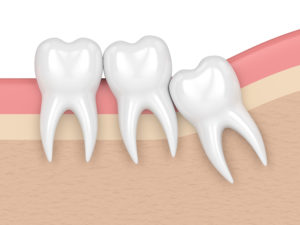3 Signs Your Wisdom Teeth Might Be Impacted


When wisdom teeth do not erupt properly, they become “stuck” (impacted) in the bone and/or gums. Impacted wisdom teeth contribute to a number of oral health complications, including facial pain, increased risks for infections, and reduced oral function.
Following are three common signs of wisdom teeth impaction.
Gum Inflammation
If you notice that your gums are inflamed – especially at the back of the mouth – it might be a sign that your wisdom teeth are impacted. Inflammation of the gingiva is a common indicator of wisdom tooth impaction. Bleeding of the gums is also a typical sign of impacted wisdom teeth.
Inflammation, changes in the color of the gingiva, and bleeding should be evaluated by a dentist. We recommend making an appointment with your oral healthcare provider as soon as possible.
Jaw Pain
Impacted teeth can cause facial and jaw pain. Patients whose wisdom teeth are impacted might experience difficulty opening and closing their mouth. They might also suffer with swelling near the jaws and lower part of the face.
Removing wisdom teeth will eliminate jaw and facial pain associated with their impaction.
Difficulty Eating
Biting and chewing food with impacted wisdom teeth can be difficult. Some patients might experience discomfort when drinking hot or cold beverages, too. If you have trouble eating, it is important to discuss these symptoms with your dentist.
Regular checkups will reveal whether your wisdom teeth are impacted. If your dentist finds that your wisdom teeth have arrived, he or she will likely refer you to an oral surgeon for their removal. Having your wisdom teeth extracted can prevent an array of health complications and quality of life issues.
We are accepting new patients. Call Jackson Oral Surgery today to schedule a consultation with our experienced oral surgeon.